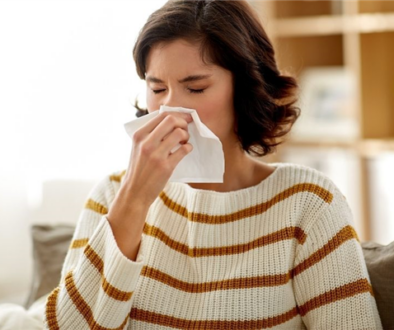Can I Give My Toddler Allergy Medicine? Our Guide for Parents
It’s hard enough for you to manage the sniffling, sneezing and sore throats that accompany allergy season —but it’s even worse to see your child suffer these same symptoms.
But before you reach for the over-the-counter medicine to treat your toddler, you should remember that children aren’t “little adults,” and even medicine that states it’s “safe” for young children may still not be appropriate.
While you can give allergy medicine to toddlers, it’s very important to do so only after talking with one of our doctors at Raleigh Capitol ENT who specialize in treating children. Many children react differently to various medications.
We’ll take a look at the various options for allergy treatment for toddlers, some common toddler allergy medicines, and toddler allergy symptoms.
Can I Give My Toddler Allergy Medicine?
Yes, but you should be aware of some of the effects allergy medicine might have in toddlers–and that no two toddlers may react the same. You may find that antihistamines may cause either excessive drowsiness or even excitability, depending upon your child.
Important Information to Remember About Toddler Allergy Medication
One of the most important aspects to remember is to work closely with us. As the area’s leading experts in all aspects of pediatric ear, nose and throat issues, we’re in a unique position to help you by creating a treatment that is tailored to what your child needs. Talk to us before giving your toddler allergy meds because children are often more sensitive than adults to many medications.
It’s also important to realize that even though some over-the-counter products say that they are safe for children, that does not mean that it is intended for children of all ages. We encourage you to carefully examine the label.
Often, different products may have the same active ingredient, although they are marketed to treat different symptoms. While you may think you are purchasing products to treat different symptoms, in actuality, all these medicines may have the same ingredients. As a result, your toddler may receive too much of a certain type of medication.
We Examine Some of the Best Toddler Allergy Medicines
We’ll take a look at some of the most common medications used to alleviate allergy symptoms in toddlers.
Saline Solutions
Often the simplest solution is also the best. Nasal saline solution is not only a very effective treatment for allergies in toddlers, but it is also the safest.
Other the Counter (OTC) Allergy Medications
When purchasing an OTC allergy medication for your toddler, remember to follow the labels carefully and purchase the “kid friendly” versions of brands such as:
- Claritin (loratadine)
- Zyrtec (cetirizine)
- Allegra (fexofenadine)
- Benadryl (diphenhydramine)
Remember that these OTC antihistamines are for those ages 2 and up.
Nasal Steroid Sprays
There are certain steroid sprays, such as Flonase and Nasacort, that are okay to use in children. However, even then, you should carefully follow directions because many nasal steroid sprays are NOT appropriate for toddlers.
For example, some sprays, such as Flonase, should NOT be used in those younger than 4.
In addition, Rhinocort spray should only be used in children who are 6 and older.
We would like to emphasize that nasal steroid sprays should only be given to your children–of any age—cautiously. We encourage you to check with us first, and we can give you a list of effective over-the-counter sprays that would be appropriate.
Allergy Medications You Should Avoid
You should NOT give your toddler oral decongestants. These should NOT be used in children who are younger than 12. Examples include Sudafed and Afrin.
If your child is between the ages of 2 and 6, and OTC medications are not working within one to two weeks, please call our office to schedule an appointment.
When to Give a Toddler Allergy Medicine
You should follow the label closely to determine the best time to give your toddler allergy medicine. Often, giving the medicine before bedtime can help alleviate morning symptoms.
If pollen gives your child trouble, consider starting it around 3 to 10 days before allergy season is in full bloom.
However, before you start giving your child a regular regimen of allergy medicine, take decisive steps to change your environment to minimize the impact these seasonal allergies have on their life. For example:
- Close windows during pollen season
- Wash your pets after they’ve been outside—often our furry friends will carry pollen in from outdoors
- Be sure to use washable area rugs
- Use a vacuum cleaner with a HEPA filter
- If possible, change clothes after being outside—this will keep you from bringing allergens into your home
In some cases, this may be enough to provide some allergy relief.
What Are the Most Common Toddler Allergy Symptoms?
Allergic rhinitis is the most common childhood allergy condition, and its toddler allergy symptoms are very similar to those in adults. These symptoms include:
- Runny nose
- Sneezing
- Congestion
- Postnasal drip
- Watery eyes
- Chronic ear infections
- Repeated ear problems
Raleigh Capitol Ear, Nose and Throat Has Extensive Pediatric ENT Services to Help Your Toddler
Did you know that we are the only office in Wake County that offers all aspects of pediatric ear, nose and throat evaluation as well as treatment?
This is because our children’s ENT doctors have had extensive training after medical school in caring for pediatric patients. We offer evaluations including:
- Treatment for allergies
- Help to correct hearing problems
- Speech evaluation and treatment
- Surgical pediatric ENT procedures
- Hearing tests for infants and children
Don’t let your toddler suffer from seasonal allergies. Schedule an appointment with us today.
This article and the articles on this website are for educational purposes only and do not constitute medical advice. If you have questions or concerns, please contact your healthcare provider.




